Research and development of food products are part of the field of food technology, which focuses on production, preservation,Careers In quality control and research and development. Initially, food preservation was the focus of food technology. A crucial event in 1810 was the development of the canning process by Nikolaus Appert. Appert did not know how his canning process worked and did not call his process canning then, but canning has indeed had a major impact on food preservation techniques.Careers In A major contribution to the application of scientific knowledge to food handling was Louis Pasteur’s research on spoilage of wine and his description of how to prevent it in 1864. In addition to researching wine spoilage, Pasteur researched the production of alcohol, vinegar, wines and beer, as well as sour milk. During his lifetime, he developed pasteurization, a process of heating milk and milk products to kill bacteria that cause food spoilage and disease.Careers In Pasteur pioneered both bacteriology and modern preventive medicine in his research into food technology.
Emerging technologies
New types of raw materials processing technology, new packaging methods, and new food additives are all examples of innovation in the food sector. It may be possible to prevent or reduce adverse effects caused by microorganisms, oxidation of food ingredients, and enzymatic and nonenzymatic reactions by applying new solutions. Aside from improved food quality and nutritional value, improvements in food composition will also enhance perception and pleasures from eating food through changes in organoleptic properties as well as changes in perception and a sense of taste.[4] In the 21st century, emerging technologies include cellular agriculture, particularly cultured meat, 3D food printing, and insect protein.
Consumer acceptance
In the past, food technologies received little attention from consumers. In today’s world, food production chains are long and complicated, and food technology is diverThus, consumers have difficulty understanding the determinants of food quality and are uncertain about them.hem. Now, the acceptance of food products depends a great deal on perceptions of their benefits and risks. People’s views of food processing technology are important. The consumer perception of some food technologies, especially ones that are innovative, varies. It is generally accepted that pasteurization, high-pressure treatment, and even microwaves are safe methods. According to the Hightech Europe project, traditional technologies are well accepted, whereas innovative ones are not.[7] Consumers’ attitudes toward innovative food technologies can be explained through three main mechanisms: First, by their knowledge of risks and benefits associated with the technology, second, by their own experiences, and third, by their application of higher-order values and beliefs.[8] Several scholars have pointed to the trade-off between risk and benefit as one of the main factors affecting consumer acceptance[9], although others place more emphasis on the role that consumers’ perception of benefits plays.[10] Rogers (2010) defined five major criteria that determine the acceptance of new technology by consumers: complexity, compatibility, relative advantage, trialability, and observability. [11] The acceptance of innovative technologies can be enhanced by providing non-emotional and concise information about these new technological processes.
